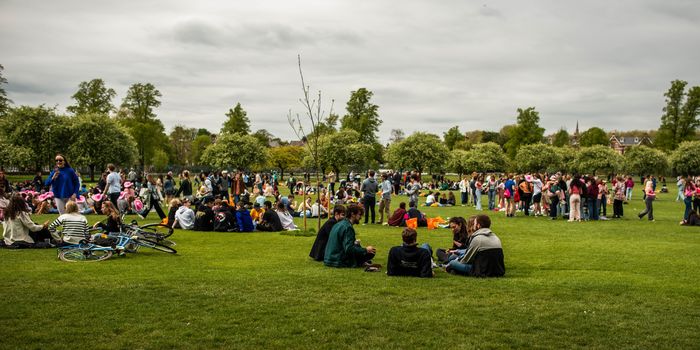Notebook: Champagne and socialism in the Carolean age
Maia Livne reflects on her second year at Cambridge, musing on the monarchy, ghost stories, and the liminality of delayed trains

It is raining again. Hot mid-May showers bend the tulips on the river bank. This winter-spring is an odd hybrid creature, and summer’s dry heat feels more like a faded memory than an approaching sensation on my skin. Seasonal confusion is an ideal ground for temporal jumps, so I wonder if this resembles how the summerless year of 1816 felt, when the Shelleys and Lord Byron escaped the bad weather to write ghost stories together in Switzerland. That year did not birth any summer, but it did end up birthing Mary Shelley’s Frankenstein. Some years are for peaches; some are for ghosts, and ghosts have longer shelf lives.
Jumping back to the rainy present, I am at the coronation picnic, standing shielded under the Nevile’s court cloisters, watching the rain pour on the lawn. Through my third coronation-champagne cup, I start to wonder whether the threatening omens of my friends in my home country have fulfilled themselves, and I have indeed found myself in the land of cold winds and monarchical pomp. For there was little I knew about England when I first landed at Heathrow on 5 September 2021; I did not know who Chris Whitty was, I did not know cash payments were a far-forgotten element of human trade, I did not know Friday was for greasy fish. Naively, I would have assumed Yorkshire pudding to be a dessert and for people not to be constantly lying to each other for a weird, decorous gossip culture. One thing I did know, however, was that this country had a rather old Queen. And not to say that my arrival was the social catalyst for the dawn of the third Carolean age, but definitely my degree has proven rich in monarcheal shifts. This notion, which might be obvious to many, escaped me until the evening of Saturday 6 May, when my roommate and I were setting our steps back to college, equipped with Sainsbury’s finest and most fragrant soup (Tomato and Basil). Our college’s great gate was suddenly flooded with fluorescent lights, constructing the multi-colour hologram of King Charles III’s face. It was then that I started slipping into reflection on how the hell I stumbled upon this specific timeline.
“If my first year in England felt like a subtitled life, this year I finally started losing myself in translation”
Immigration often feels like an intrusion to a different parallel life. Even with language, I felt like performing a pantomime presentation of my thoughts. Local expressions often felt like trying on costume accessories. And yet costumes quickly became a second skin, as my essay plans, grocery lists, and even personal conversations all slowly moved into English, I eventually found myself loving, fighting and laughing in English. The last straw was when my infamous dreams, which my beloved friends have often heard me recount in detail over endless breakfasts, started featuring English speaking serpents and walls. Hebrew and French slowly faded into my mind into a sphere of memories and intimate thoughts. If my first year in England felt like a subtitled life, this year I finally started losing myself in translation.
If this year I spent the coronation sipping champagne in Nevile’s court, before then these events almost seemed to escape me more than I was avoiding them. Last year, I spent the Queen’s Jubilee in the liminal space of a train stuck between Stevenage and Welwyn Garden City because someone was on the tracks.
And while I too was getting stressed and frustrated, I also thought about all the times I took for granted that transportation was completely stopped because Obama was coming around, or because the prime minister’s car was about to pass by, and how do we come to accept that certain lives are worth traffic jams and champagne picnics whilst certain lives are worth nothing at all until they insist on desperately throwing themselves under society’s wheels.
This is a thought that has re-emerged more and more through my past two years in Cambridge, especially through this last one. Cambridge’s jarring wealth gap is a topic which is repeatedly brought up, and understandably so. It can feel almost obvious to mention this, but there is truly nothing less obvious nor logical to the fact that people sleep in castles near people who sleep in the street. Imagination and knowledge, faculties which we all hope to nurture and build up, flourish when they are used to create connections between people, not to lift walls and seclusions between them.
 News / SU reluctantly registers controversial women’s soc18 December 2025
News / SU reluctantly registers controversial women’s soc18 December 2025 Features / Should I stay or should I go? Cambridge students and alumni reflect on how their memories stay with them15 December 2025
Features / Should I stay or should I go? Cambridge students and alumni reflect on how their memories stay with them15 December 2025 News / Dons warn PM about Vet School closure16 December 2025
News / Dons warn PM about Vet School closure16 December 2025 News / Cambridge study finds students learn better with notes than AI13 December 2025
News / Cambridge study finds students learn better with notes than AI13 December 2025 News / Uni registers controversial new women’s society28 November 2025
News / Uni registers controversial new women’s society28 November 2025










